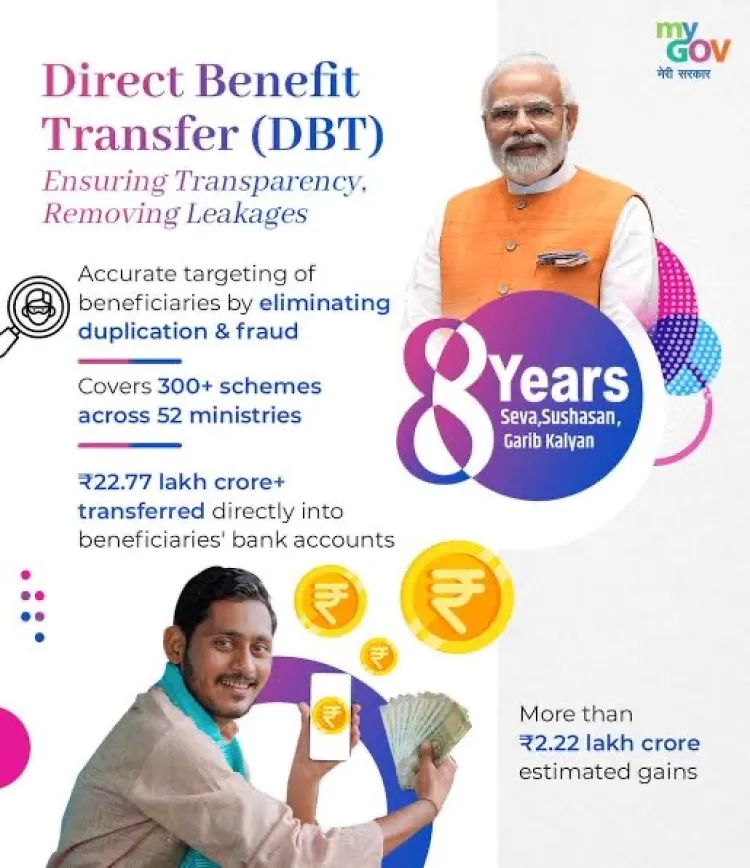Ahmedabad
(Head Office)Address : 506, 3rd EYE THREE (III), Opp. Induben Khakhrawala, Girish Cold Drink Cross Road, CG Road, Navrangpura, Ahmedabad, 380009.
Mobile : 8469231587 / 9586028957
Telephone : 079-40098991
E-mail: dics.upsc@gmail.com

DBT in India – A role model for the world
News: Recently, DBT has garnered international recognition for its significant impact on social welfare and governance reforms.
Background:
• The IMF and World Bank applauded DBT for its scale and logistical prowess for reaching hundreds of millions of low-income individuals.
• DBT in India is not just a national initiative; it also aligns with India’s broader goals within its co-chairship of the Global Partnership for Financial Inclusion. For its impact on promoting transparency, DBT was also showcased in the G20 Anti-Corruption Working Group Meeting.
What is DBT and how has it evolved over the years?
• The Direct Benefit Transfer was envisioned as a system where welfare benefits provided by the government are directly credited to the identified beneficiary’s bank or postal account.
• The benefits provided range from cash assistance to in-kind goods and services. For example, Cash support schemes such as PM KISAN, which supports farmers, and the National Social Assistance Programme (NSAP), providing pensions for the elderly, Divyangjan, and widows.
• In-kind support schemes include the fertilizer subsidy, the Public Distribution System for food grains support.
• DBT schemes employ the use of the electronic ID Aadhar for identifying and authenticating the intended beneficiaries.
What are the benefits of DBT?
• Efficiency - DBT eliminates intermediaries, ensuring that funds directly reach the intended beneficiaries, making the process faster and more efficient.
• Ensures transparency and reduces chances of corruption as the benefits are transferred electronically and intermediaries are removed.
• Using Aadhaar for beneficiary identification aids in ensuring that the benefits reach the correct individuals.
• By eliminating wastage, DBT helps the government save significant resources that can then be deployed for other welfare schemes.
• It has promoted Financial inclusion in true sense, it allows for real-time tracking of fund disbursement and has empowered the rural economy significantly.
• DBT reduces the fiscal deficit by saving public expenditure on subsidies and welfare schemes.
What are the challenges?
• Many rural and tribal areas still lack banking facilities, road connectivity, internet connectivity, power supply, etc. that are essential for smooth delivery of DBT.
• There may be instances of fake or ghost beneficiaries, diversion of funds, manipulation of records, etc. that undermine the transparency and accountability of DBT.
• People face difficulty in enrolling for DBT due to lack of proximity to enrolment centres.
• The value of transfers may not be sufficient to cover the actual cost of goods or services that the beneficiaries need to purchase from the market.
Some data that you should remember:
• According to the Secretary of the Department of Economic Affairs, India saved $27 billion in various central government schemes through the implementation of DBT in the fiscal year 2022-23. Saumyakeshava Temple, Mandya District
• According to the President of the World Bank Group, India managed to provide food or cash support to a remarkable 85 per cent of rural households and 69 per cent of urban households through DBT during the COVID-19 pandemic.
• According to a research paper by IFPRI, DBT for agricultural subsidies in India has shown positive impacts on fertilizer use efficiency, crop yields, farm incomes, and environmental quality.
Way Forward
• The Digital public infrastructure (DPI) enabled DBT has emerged as a boon in providing succour and relief to millions of citizens (For eg even delivery of vaccines through DPI).
• India can use its technical expertise and knowledge to empower people from the Global South as much as it is empowering its own!
Source – Yojana

Address : 506, 3rd EYE THREE (III), Opp. Induben Khakhrawala, Girish Cold Drink Cross Road, CG Road, Navrangpura, Ahmedabad, 380009.
Mobile : 8469231587 / 9586028957
Telephone : 079-40098991
E-mail: dics.upsc@gmail.com
Address: A-306, The Landmark, Urjanagar-1, Opp. Spicy Street, Kudasan – Por Road, Kudasan, Gandhinagar – 382421
Mobile : 9723832444 / 9723932444
E-mail: dics.gnagar@gmail.com
Address: 2nd Floor, 9 Shivali Society, L&T Circle, opp. Ratri Bazar, Karelibaugh, Vadodara, 390018
Mobile : 9725692037 / 9725692054
E-mail: dics.vadodara@gmail.com
Address: 403, Raj Victoria, Opp. Pal Walkway, Near Galaxy Circle, Pal, Surat-394510
Mobile : 8401031583 / 8401031587
E-mail: dics.surat@gmail.com
Address: 303,305 K 158 Complex Above Magson, Sindhubhavan Road Ahmedabad-380059
Mobile : 9974751177 / 8469231587
E-mail: dicssbr@gmail.com
Address: 57/17, 2nd Floor, Old Rajinder Nagar Market, Bada Bazaar Marg, Delhi-60
Mobile : 9104830862 / 9104830865
E-mail: dics.newdelhi@gmail.com